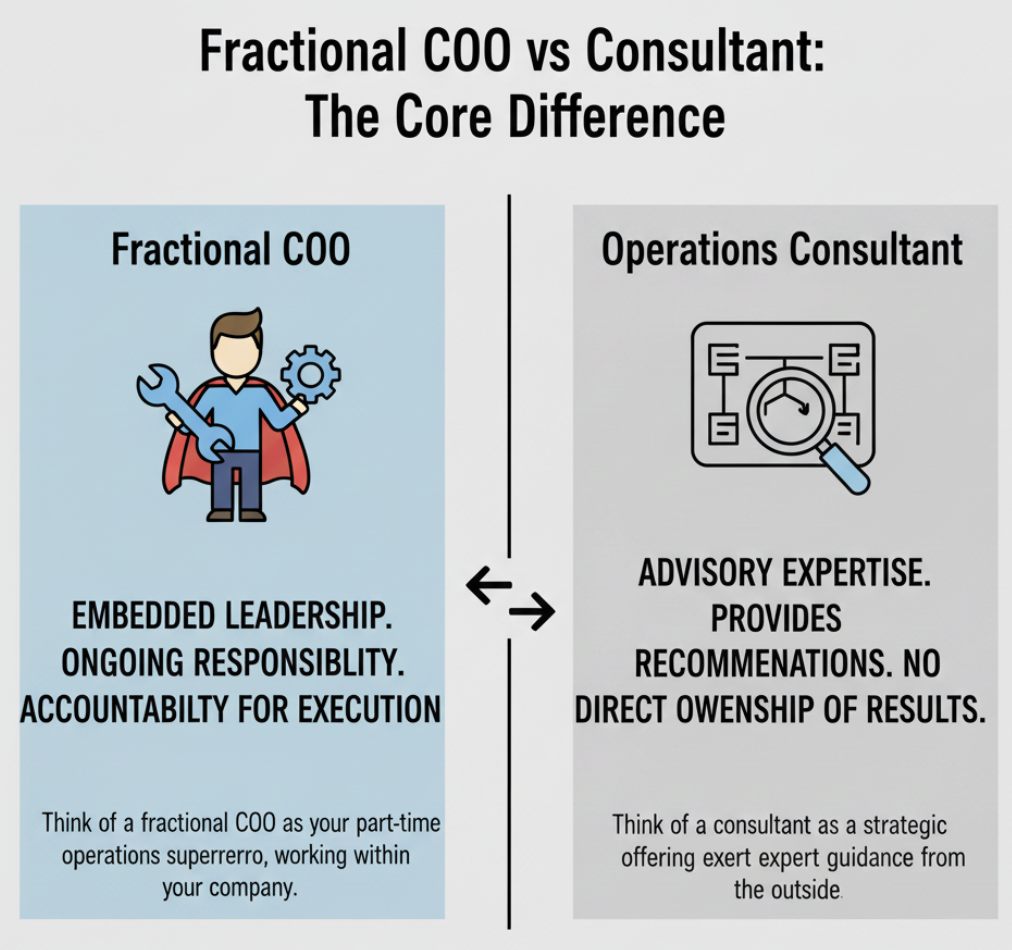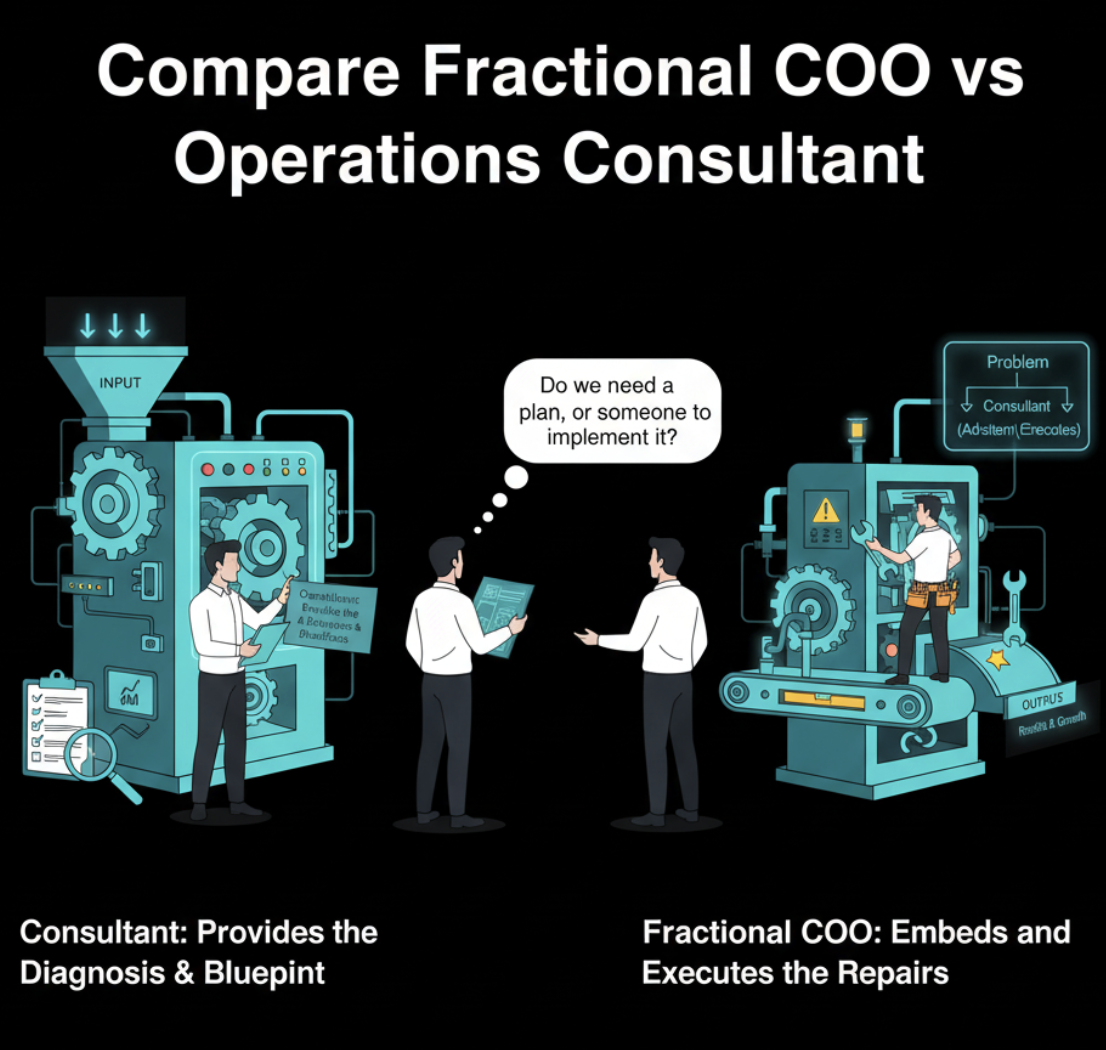Introduction: Choosing the Right Operational Support
As your business grows, operational challenges can quickly outpace your bandwidth. You may find yourself debating whether to bring in a fractional COO or an operations consultant. Both provide strategic support, but they play very different roles. Making the wrong choice could mean stalled growth, wasted budget, or unimplemented ideas.
At NeoGig — Executive Talent. On-Demand., we often guide founders and executives through this very decision. Let’s break down the differences between these two options so you can decide which fits your stage of growth.

Fractional COO vs Consultant: The Core Difference
At the highest level:
- Fractional COO = Embedded leadership, ongoing responsibility, and accountability for execution.
- Operations Consultant = Advisory expertise, providing recommendations without direct ownership of results.
Think of a fractional COO as someone who joins your leadership team part-time, while a consultant remains outside the organization, offering perspective and recommendations.
What is a Fractional COO?
A fractional COO (Chief Operating Officer) is an experienced executive who embeds into your business part-time. They operate like a traditional COO but on a fractional basis, allowing growing companies access to leadership they may not be ready to afford full-time.
Responsibilities of a Fractional COO:
- Overseeing day-to-day operations
- Building processes and systems that scale
- Managing cross-functional teams
- Translating the CEO’s vision into execution
- Driving accountability across the organization
👉 For example, if you’re preparing to raise funding or scale rapidly, a fractional COO can ensure your business infrastructure keeps pace with growth.
What is an Operations Consultant?
An operations consultant provides external expertise and advice. Instead of embedding within your company, they evaluate current systems, diagnose problems, and offer recommendations for improvement.
Responsibilities of an Operations Consultant:
- Conducting operational audits
- Identifying inefficiencies and bottlenecks
- Recommending new processes or tools
- Providing best practices from other industries
- Delivering reports and frameworks for the team to implement
👉 Consultants are valuable when you need clarity or expert advice but already have the internal resources to execute on recommendations.
Comparison Table: Fractional COO vs Consultant
| Aspect | Fractional COO | Operations Consultant |
|---|---|---|
| Engagement Model | Embedded leadership, part-time | External advisor, project-based |
| Accountability | Owns execution and results | Provides recommendations only |
| Integration | Acts as part of leadership team | Works outside the organization |
| Duration | Ongoing (months to years) | Short-term (weeks to months) |
| Best For | Scaling companies needing execution leadership | Companies needing clarity & diagnostic advice |

Which One Should You Hire?
Ask yourself:
- Do we need ongoing leadership and accountability? → Hire a fractional COO.
- Do we need outside expertise and recommendations but have the team to execute? → Hire a consultant.
In many cases, businesses start with a consultant to gain clarity, then bring on a fractional COO to execute once they have a clear direction.
Leveraging AI in Operations Support
Whether you work with a fractional COO or a consultant, both roles increasingly use AI-driven tools to:
- Automate reporting and dashboards
- Streamline workflows
- Forecast performance
- Accelerate decision-making
For example, frameworks like Prompt Engineering for Business can supercharge how executives and consultants alike approach operational efficiency. Leaders who embrace AI gain a competitive edge in both cost savings and speed.
FAQ: Fractional COO vs Consultant
1. What’s the main difference between a fractional COO and an operations consultant?
A fractional COO is embedded in your company and accountable for execution, while a consultant provides recommendations without ongoing leadership responsibilities.
2. When should I hire a fractional COO?
Hire a fractional COO when your company is scaling quickly and you need leadership to implement systems, manage teams, and drive execution.
3. When is an operations consultant a better choice?
A consultant is ideal if you need outside expertise or diagnostic clarity but already have capable managers who can execute the advice given.
4. Can I use both a consultant and a fractional COO?
Yes. Many companies engage a consultant for strategy recommendations, then hire a fractional COO to operationalize and execute those ideas.
5. How much do fractional COOs and consultants cost?
Consultants typically charge project-based fees, while fractional COOs work on a retainer or part-time salary basis. The right choice depends on your budget and growth stage.
Conclusion: Making the Right Choice
Both fractional COOs and operations consultants bring tremendous value — but in different ways. The key is aligning the role to your current business needs.
At NeoGig, we specialize in helping companies find the right executive talent, whether fractional, project-based, or temp-to-hire. If you’re weighing whether a fractional COO or consultant is the right move, explore how NeoGig can support your executive hiring.







